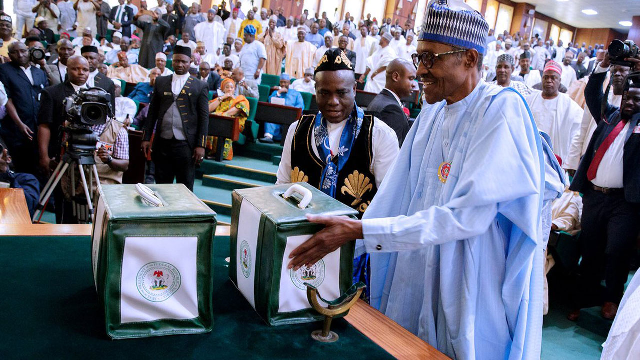Barring any last-minute change, President Muhammadu Buhari will Wednesday sign the 2018 Appropriation Bill into law, according to a Thisday report
In fact, but for the June 12 activities, including the investiture of late Chief Moshood Abiola, Ambassador Babagana Kingibe and late Chief Gani Fawehinmi, the president would have signed the bill Tuesday, to bring to a close several months of delay in the promulgation of the nation’s financial estimates, an impeccable presidency official disclosed to Thisday.
The president had last November laid the 2018 Appropriation Bill before a joint session of the National Assembly. However, it was not until May 16 (six months after), that the National Assembly passed the bill. Afterward, it took them another 10 days to transmit it to the president.
The source explained the delay in presidential assent, saying the president had a window to go through the fiscal document before signing, noting that the president has not yet exhausted the window.
However, he disclosed that barring any last-minute change of plan, he was confident the president would assent to the budget Wednesday at the State House.
If the president had assented to the 2018 Appropriation Bill Tuesday (June 12, 2018), it would have amounted to a repeat of the 2017 Budget, which was also signed by the then acting President (now Vice President), Prof. Yemi Osinbajo, on June 12, 2017 after it was passed by the National Assembly on May 5, 2017.
Buhari had laid a proposal for N8.6 trillion but the federal legislators had increased it to N9.1 trillion, an additional N508 billion, they explained was applied to critical sectors of the economy, including the reduction of the budget deficit, security, health and power, works and housing.
The increment had triggered fears that the executive might decline assent, replaying the altercation over the 2017 budget.
But the source said although the executive had reservations similar to those of last year, explaining that it was preferred that increase in revenue occasioned by the rising price of oil be used to reduce the deficit in the budget, the president was advised to sign it to avoid further delays that might further injure the economy.
“Just like last year, the president was advised to assent to the bill and seek resolution of the grey areas later,” the source said.
Nigerians had expressed strong worries over the delay in the passage of the money bill, warning that it could worsen the precarious state of the economy.
One of the very vocal critics of the legislative sluggishness over the bill was the Chief Executive Officer of Financial Derivatives Company Limited, Mr. Bismarck Rewane, who warned against delaying the budget further.
He advised the president to ensure that the budget was signed into law immediately, saying the delay was hurting the economy.
He said: “But why the delay? If the president has objections to what was passed by the National Assembly, then he ought to have engaged the legislature to resolve because the delay is causing the economy a lot of money and is hurting the economy.













